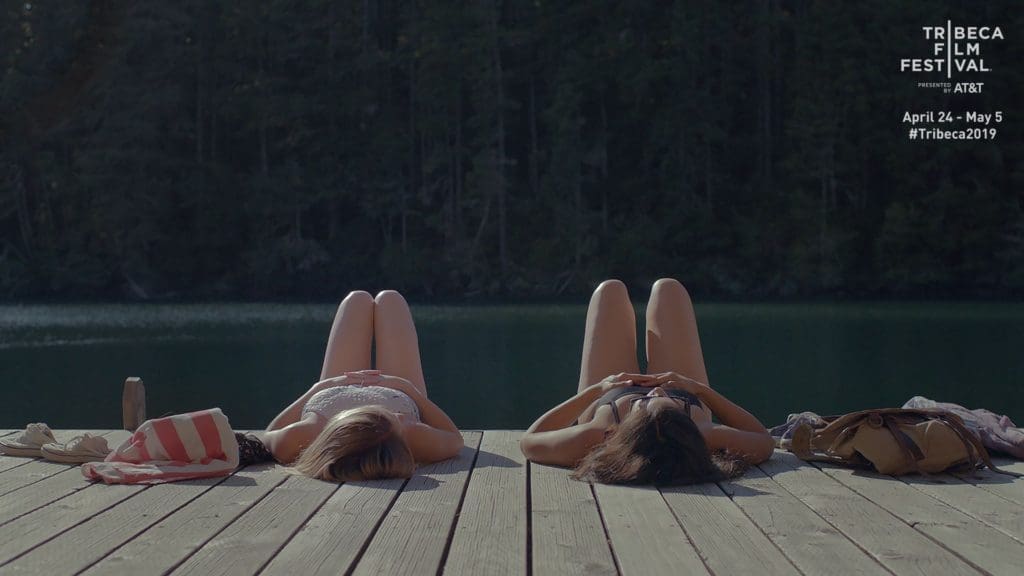
Writer-director Lara Jean Gallagher’s first feature, Clementine, which premiered at Tribeca this afternoon, begins with a home video of a young girl in repose. The girl, Karen, played by Otmara Merrero, flirts with the camera as the unseen person recording her worries that Karen will one day break her heart. “I’ve never broken one single heart,” Karen says coyly and based on a century of film history, we expect her to do exactly that to the speaker, who we later learn is Sonya Walger’s “D.” Instead, we smash cut to a heartbroken Karen. It’s a compelling beginning, but Gallagher’s film quickly squanders that intrigue.
Granted, that’s not due to what’s happening so much as the filmmaking techniques used to tell the story. After that initial video, the film is largely dialogue-less for the next 20 minutes as Karen escapes a city we later learn is Los Angeles (sans dog because D. changed the locks without telling her) and breaks into D.’s lake house in some unnamed wooded landscape. Gallagher and cinematographer Andres Karu use oblique angles and frequent close-ups and editor Alexander Morris’s rapid cutting style elides so much time that that section of the film can feel like a montage. And while that choice keeps the film moving, it also keeps us so distant from Karen’s reasoning that it’s difficult not to wonder why she’s making the decisions she does. Maybe she has nowhere else to go or maybe she wants to take some sort of revenge on D. We never know and the longer the film goes on, the harder it becomes to overcome that sense of distance.
That becomes a serious problem when Karen encounters a young, bikini-clad girl sunbathing near the lake. Her name is, Lana (Sydney Sweeney), and with her bedroom eyes and smart mouth, she’s clearly supposed to be a lust object for Karen. The problem is, the film never justifies Karen’s interest. Sure, Lana is beautiful and clearly flirting with Karen, but she’s also–if she really is 19–far too girlish to attract an adult woman. She’s at turns manic and sexy and duplicitous. Yet despite Sweeney’s clear commitment to the part, Lana is simply never believable as a person. That’s unfortunately true for the rest of the cast as well.
Though they commit to their parts, it’s the script that ultimately fails them. Gallagher clearly wants to play with the Lolita narrative from a queer, female lens, but she simply slots her characters into their respective parts and then does little more to develop them. D. is a cruel ex who threatens to appear at any moment to put an end to Karen and Lana’s flirtation. Beau is the pretty beefcake who threatens to woo Lana away while spewing homophobic slurs. Worst of all, we’re supposed to root for Karen and Lana even though the actresses don’t really have any chemistry.
That last point, is probably Clementine‘s fatal flaw. Because the film never makes us believe in the connection between its central couple, none of the story beats work either. We don’t buy it when Karen gets jealous of Lana’s attraction to Beau and we therefore don’t buy it when the Chekhov’s Gun that appears in the first act appears in the last. It’s difficult to talk about that final act without spoiling everything but suffice to say things get both dangerous and emotional. Unfortunately, it’s hard to care because the film never bothered to convince us to invest emotionally in these people.
While there is power in women taking narratives historically reserved for men for ourselves, it’s a shame Clementine does so at the cost of perpetuating a twisted Lolita fantasy. Lana is both more conniving than Karen and the film think and less alluring than we’re supposed to feel. Part of that is due to the script and performances, but a large part of that is baked into the premise. Young girls are not as dangerous as patriarchal culture paints them as being. Rather, they are only reflections of the grotesqueness of those who gaze at them and Gallagher, with her beautiful cinematography and soft approach, doesn’t push her film far enough.

